“We Shouldn’t Write Schoolchildren Off At Age Seven”

Kensington Primary has moved from RI to outstanding in less than three years but is now setting its sights even higher

- by Elaine Bennett
- Digital content manager for Teachwire and former Teach Primary magazine editor

‘At 1pm or 2pm on a Sunday afternoon, a knot in my stomach would start and I’d be dreading going into work the next day,’ says Kensington Primary headteacher Ben Levinson, for whom the world of teaching is a second career. He’s talking about his previous life in marketing, which he left behind seven years ago.
‘I got to the point where I thought, ‘Is this what I want to do for the rest of my life?’ I decided probably not. I always talk about the fact that you should love coming to work and that’s the whole reason I moved jobs. Now it gets to Monday morning and I’m like, ‘Right, let’s do this!’
Ben joined Kensington Primary as deputy head three and a half years ago. In the period between accepting the appointment and starting, Ofsted downgraded the school from ‘good’ to ‘requires improvement’. ‘I kind of knew the school was in trouble when I first walked round,’ says Ben.
‘It was just the feel of it, the way the children were. There are hundreds of display boards in this school and I know it sounds like a really silly thing, but one of the first things I noticed was that literally every single one had artwork on it. It was lovely artwork, but what does that say to the children about what the priorities are for the school? There was no writing, no maths, no science – nothing. To me, that really demonstrated what some of the issues were here.’
The school had fallen into the bottom 20% in the country for its results. There was mould on the ceilings and water coming through the walls and staff morale was low. ‘It was in a real state,’ says Ben. ‘The budget was also in a really bad place. There were lots of teachers on upper pay scales – none of whom actually worked with the children. People weren’t really held to account and there was a very loose management structure.’
Shafi
 In Kensington Cares we separated food into different boxes and dropped it off near the library. Some of the children carried it but most of it was carried in cars. The food goes to migrants and refugees.
Ziyad
In Kensington Cares we separated food into different boxes and dropped it off near the library. Some of the children carried it but most of it was carried in cars. The food goes to migrants and refugees.
Ziyad
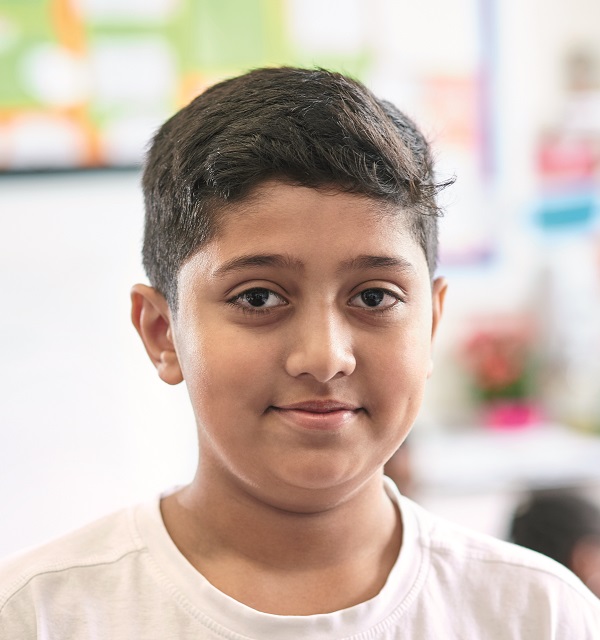 Every Monday afternoon we have a one-hour Mandarin lesson. Sometimes we do role play and have conversations with each other. Last term we had a Mandarin test and we had the highest percentage of passes in the local area.
Every Monday afternoon we have a one-hour Mandarin lesson. Sometimes we do role play and have conversations with each other. Last term we had a Mandarin test and we had the highest percentage of passes in the local area.
Meet the staff
Meredith Clements, Y5 teacher
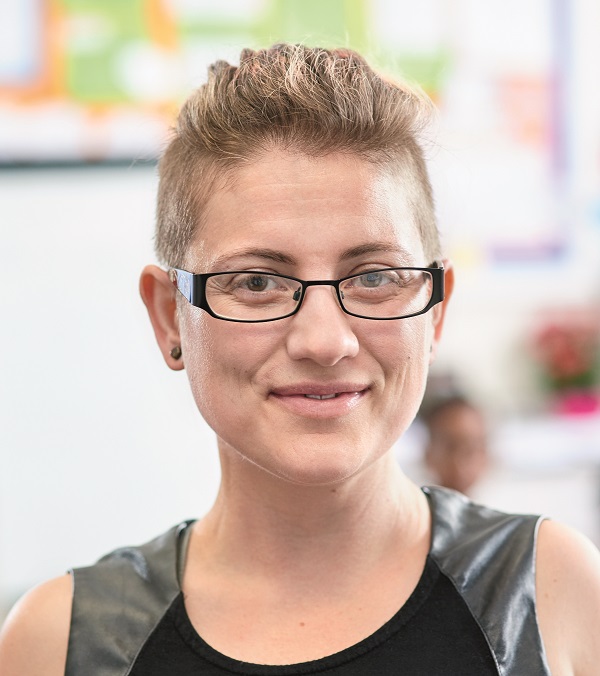 We play a game called ‘Keep, ditch, tweak’. We take different projects and have a critical look at them. Do we want to keep them how they are or change them? We’ll share ideas and that way we’re always reflecting, improving and driving things forwards. If we ever felt that what we were doing wasn’t having an impact on the children, Ben would be more than happy to talk about different ways of doing things.
We play a game called ‘Keep, ditch, tweak’. We take different projects and have a critical look at them. Do we want to keep them how they are or change them? We’ll share ideas and that way we’re always reflecting, improving and driving things forwards. If we ever felt that what we were doing wasn’t having an impact on the children, Ben would be more than happy to talk about different ways of doing things.
Jon Pell, Y6 teacher
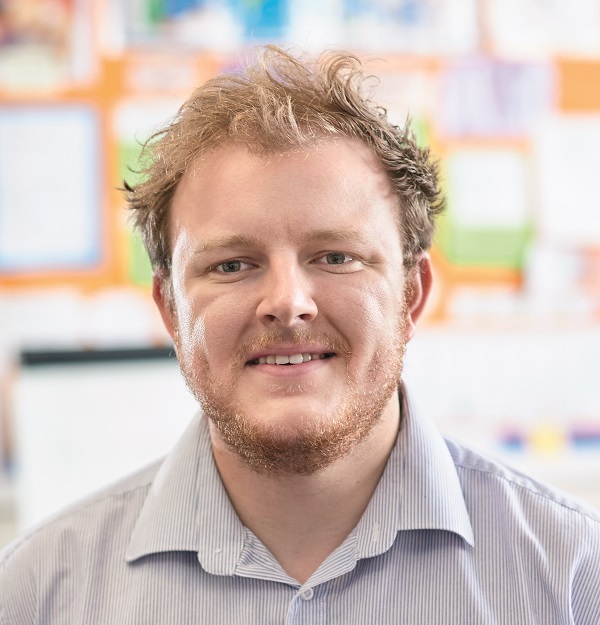 My route into the classroom was the Troops to Teachers initiative because I’m ex-army. I grew up around here and when I left the army I wanted to get into teaching. Joining this school has been fantastic – it’s a really good school to train in. I like the autonomy given to teachers here. There’s no prescribed method of teaching. Everybody learns off one another and feels comfortable bringing what they’ve learnt into the classroom.
My route into the classroom was the Troops to Teachers initiative because I’m ex-army. I grew up around here and when I left the army I wanted to get into teaching. Joining this school has been fantastic – it’s a really good school to train in. I like the autonomy given to teachers here. There’s no prescribed method of teaching. Everybody learns off one another and feels comfortable bringing what they’ve learnt into the classroom.
Tajana Ujevic, EYFS phase leader
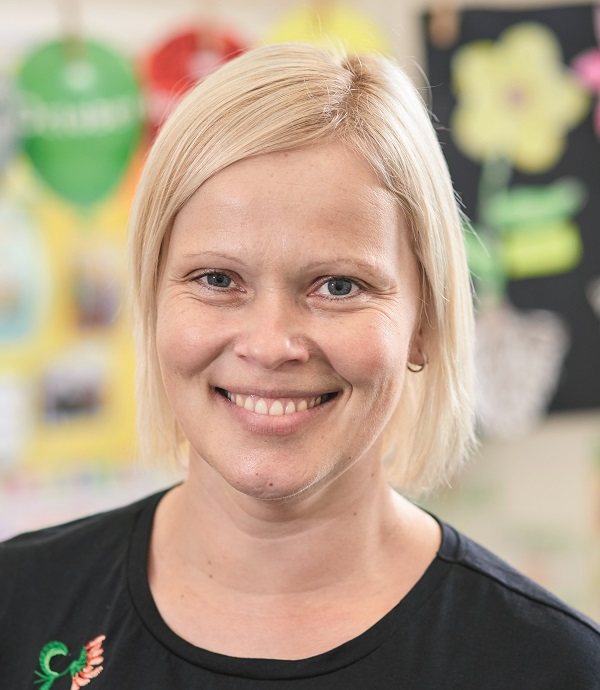 We’re not just teachers. We’re nurturers and in loco parentis – especially for the younger children. Some of our children come into Reception with no knowledge of anything – some haven’t been taken out of their buggies yet. In six or 12 months time they are chatting away to you and are excited about coming to school. That drives you on. Even though sometimes you’re exhausted, you have a sense of purpose and achievement.
We’re not just teachers. We’re nurturers and in loco parentis – especially for the younger children. Some of our children come into Reception with no knowledge of anything – some haven’t been taken out of their buggies yet. In six or 12 months time they are chatting away to you and are excited about coming to school. That drives you on. Even though sometimes you’re exhausted, you have a sense of purpose and achievement.
Soofia Amin, EAL & Community Lead
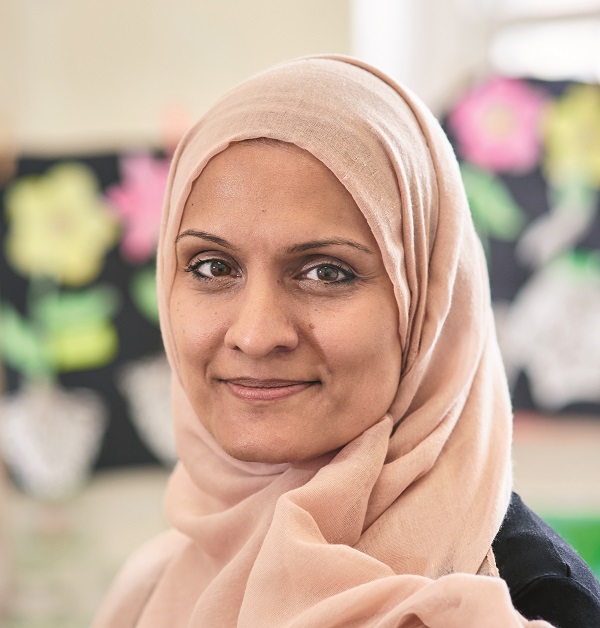 After her Parent Gym course, one mum said to me that her house has changed – her relationship with her husband is good because they’re not blaming each other any more and her son is now responsive. Before, she didn’t have any systems in place. We teach parents the basics: structure, routines, reward charts and looking at how they communicate. It’s not rocket science – just very simple strategies – but every session is amazing.
After her Parent Gym course, one mum said to me that her house has changed – her relationship with her husband is good because they’re not blaming each other any more and her son is now responsive. Before, she didn’t have any systems in place. We teach parents the basics: structure, routines, reward charts and looking at how they communicate. It’s not rocket science – just very simple strategies – but every session is amazing.
Soofia agrees: ‘Even if they come from abroad and don’t have English, they very quickly get confident, because there’s nobody judging. I’ve never seen a child be made fun of at this school – the whole atmosphere is very supportive.’
Pupil Voice
Hana
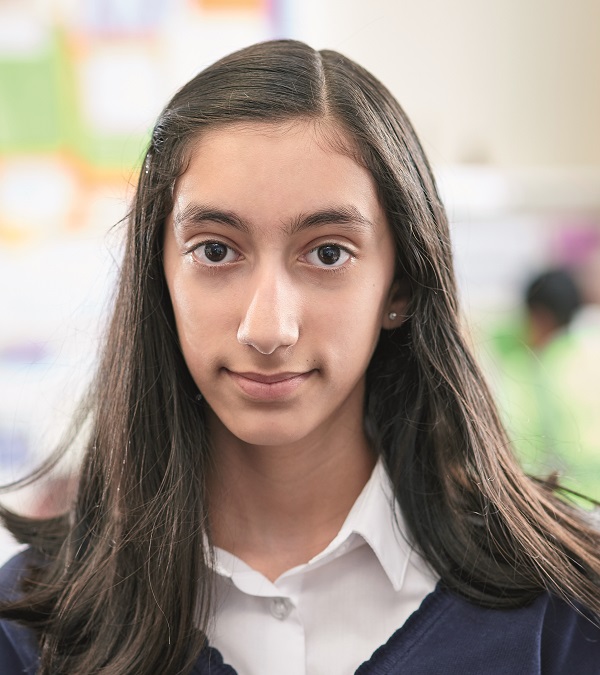 We asked children to bring in clothes that didn’t fit them so we could donate them to others. We’ve also got boxes for old ink cartridges and phones. We give the money to a hospice for terminally ill children.
We asked children to bring in clothes that didn’t fit them so we could donate them to others. We’ve also got boxes for old ink cartridges and phones. We give the money to a hospice for terminally ill children.
Aysha
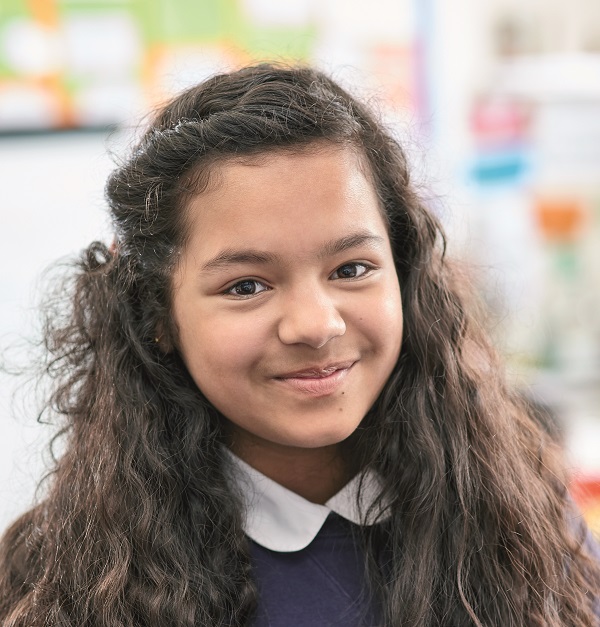 Every term we have a celebration and invite elderly people within our borough. Sometimes we serve them lunch and we have conversations with them. Recently we started a knitting club – the elderly people came and we all knitted.
Every term we have a celebration and invite elderly people within our borough. Sometimes we serve them lunch and we have conversations with them. Recently we started a knitting club – the elderly people came and we all knitted.
Shafi
 In Kensington Cares we separated food into different boxes and dropped it off near the library. Some of the children carried it but most of it was carried in cars. The food goes to migrants and refugees.
Ziyad
In Kensington Cares we separated food into different boxes and dropped it off near the library. Some of the children carried it but most of it was carried in cars. The food goes to migrants and refugees.
Ziyad
 Every Monday afternoon we have a one-hour Mandarin lesson. Sometimes we do role play and have conversations with each other. Last term we had a Mandarin test and we had the highest percentage of passes in the local area.
Every Monday afternoon we have a one-hour Mandarin lesson. Sometimes we do role play and have conversations with each other. Last term we had a Mandarin test and we had the highest percentage of passes in the local area.
Meet the staff
Meredith Clements, Y5 teacher
 We play a game called ‘Keep, ditch, tweak’. We take different projects and have a critical look at them. Do we want to keep them how they are or change them? We’ll share ideas and that way we’re always reflecting, improving and driving things forwards. If we ever felt that what we were doing wasn’t having an impact on the children, Ben would be more than happy to talk about different ways of doing things.
We play a game called ‘Keep, ditch, tweak’. We take different projects and have a critical look at them. Do we want to keep them how they are or change them? We’ll share ideas and that way we’re always reflecting, improving and driving things forwards. If we ever felt that what we were doing wasn’t having an impact on the children, Ben would be more than happy to talk about different ways of doing things.
Jon Pell, Y6 teacher
 My route into the classroom was the Troops to Teachers initiative because I’m ex-army. I grew up around here and when I left the army I wanted to get into teaching. Joining this school has been fantastic – it’s a really good school to train in. I like the autonomy given to teachers here. There’s no prescribed method of teaching. Everybody learns off one another and feels comfortable bringing what they’ve learnt into the classroom.
My route into the classroom was the Troops to Teachers initiative because I’m ex-army. I grew up around here and when I left the army I wanted to get into teaching. Joining this school has been fantastic – it’s a really good school to train in. I like the autonomy given to teachers here. There’s no prescribed method of teaching. Everybody learns off one another and feels comfortable bringing what they’ve learnt into the classroom.
Tajana Ujevic, EYFS phase leader
 We’re not just teachers. We’re nurturers and in loco parentis – especially for the younger children. Some of our children come into Reception with no knowledge of anything – some haven’t been taken out of their buggies yet. In six or 12 months time they are chatting away to you and are excited about coming to school. That drives you on. Even though sometimes you’re exhausted, you have a sense of purpose and achievement.
We’re not just teachers. We’re nurturers and in loco parentis – especially for the younger children. Some of our children come into Reception with no knowledge of anything – some haven’t been taken out of their buggies yet. In six or 12 months time they are chatting away to you and are excited about coming to school. That drives you on. Even though sometimes you’re exhausted, you have a sense of purpose and achievement.
Soofia Amin, EAL & Community Lead
 After her Parent Gym course, one mum said to me that her house has changed – her relationship with her husband is good because they’re not blaming each other any more and her son is now responsive. Before, she didn’t have any systems in place. We teach parents the basics: structure, routines, reward charts and looking at how they communicate. It’s not rocket science – just very simple strategies – but every session is amazing.
After her Parent Gym course, one mum said to me that her house has changed – her relationship with her husband is good because they’re not blaming each other any more and her son is now responsive. Before, she didn’t have any systems in place. We teach parents the basics: structure, routines, reward charts and looking at how they communicate. It’s not rocket science – just very simple strategies – but every session is amazing.
Never one to rest on his laurels, Ben’s first thought on the day after receiving the report was, ‘What’s next?’. He says, ‘I am obsessed with always doing better – there’s always more we can do. There’s still things we need to work on, and that’s what we’ve done this year and it’s what we’ll do next year and every year.’
EAL empathy
With an extraordinary number of children leaving and joining through the year, the Kensington team is adept at slotting children in and getting them up to speed as quickly as possible, as EAL and community lead Soofia Amin explains:
‘They come as quickly as they leave. The teachers are very used to it, as are the children. They are very good at making sure they’re welcome. It’s a whole-school effort.’
New arrivals follow a standard procedure during their first few weeks. Whether they speak English or not, they spend their first few days in the classroom with their teacher to get used to the daily routines. They are then assessed for EAL and phonics and within two weeks are put into a suitable programme.
‘A week where just one child joins is quite unusual,’ explains Soofia. ‘If we have a child who is from the UK or speaks English I normally fall off my chair – that’s unusual for our school.’
One of the positive aspects of having such a high turnover, according to headteacher Ben Levinson, is the sense of empathy it instils in the children.
‘Three months after joining the school themselves, they’re helping another child to settle in. They know what it feels like. They are a really caring group of children.’
Soofia agrees: ‘Even if they come from abroad and don’t have English, they very quickly get confident, because there’s nobody judging. I’ve never seen a child be made fun of at this school – the whole atmosphere is very supportive.’
Pupil Voice
Hana
 We asked children to bring in clothes that didn’t fit them so we could donate them to others. We’ve also got boxes for old ink cartridges and phones. We give the money to a hospice for terminally ill children.
We asked children to bring in clothes that didn’t fit them so we could donate them to others. We’ve also got boxes for old ink cartridges and phones. We give the money to a hospice for terminally ill children.
Aysha
 Every term we have a celebration and invite elderly people within our borough. Sometimes we serve them lunch and we have conversations with them. Recently we started a knitting club – the elderly people came and we all knitted.
Every term we have a celebration and invite elderly people within our borough. Sometimes we serve them lunch and we have conversations with them. Recently we started a knitting club – the elderly people came and we all knitted.
Shafi
 In Kensington Cares we separated food into different boxes and dropped it off near the library. Some of the children carried it but most of it was carried in cars. The food goes to migrants and refugees.
Ziyad
In Kensington Cares we separated food into different boxes and dropped it off near the library. Some of the children carried it but most of it was carried in cars. The food goes to migrants and refugees.
Ziyad
 Every Monday afternoon we have a one-hour Mandarin lesson. Sometimes we do role play and have conversations with each other. Last term we had a Mandarin test and we had the highest percentage of passes in the local area.
Every Monday afternoon we have a one-hour Mandarin lesson. Sometimes we do role play and have conversations with each other. Last term we had a Mandarin test and we had the highest percentage of passes in the local area.
Meet the staff
Meredith Clements, Y5 teacher
 We play a game called ‘Keep, ditch, tweak’. We take different projects and have a critical look at them. Do we want to keep them how they are or change them? We’ll share ideas and that way we’re always reflecting, improving and driving things forwards. If we ever felt that what we were doing wasn’t having an impact on the children, Ben would be more than happy to talk about different ways of doing things.
We play a game called ‘Keep, ditch, tweak’. We take different projects and have a critical look at them. Do we want to keep them how they are or change them? We’ll share ideas and that way we’re always reflecting, improving and driving things forwards. If we ever felt that what we were doing wasn’t having an impact on the children, Ben would be more than happy to talk about different ways of doing things.
Jon Pell, Y6 teacher
 My route into the classroom was the Troops to Teachers initiative because I’m ex-army. I grew up around here and when I left the army I wanted to get into teaching. Joining this school has been fantastic – it’s a really good school to train in. I like the autonomy given to teachers here. There’s no prescribed method of teaching. Everybody learns off one another and feels comfortable bringing what they’ve learnt into the classroom.
My route into the classroom was the Troops to Teachers initiative because I’m ex-army. I grew up around here and when I left the army I wanted to get into teaching. Joining this school has been fantastic – it’s a really good school to train in. I like the autonomy given to teachers here. There’s no prescribed method of teaching. Everybody learns off one another and feels comfortable bringing what they’ve learnt into the classroom.
Tajana Ujevic, EYFS phase leader
 We’re not just teachers. We’re nurturers and in loco parentis – especially for the younger children. Some of our children come into Reception with no knowledge of anything – some haven’t been taken out of their buggies yet. In six or 12 months time they are chatting away to you and are excited about coming to school. That drives you on. Even though sometimes you’re exhausted, you have a sense of purpose and achievement.
We’re not just teachers. We’re nurturers and in loco parentis – especially for the younger children. Some of our children come into Reception with no knowledge of anything – some haven’t been taken out of their buggies yet. In six or 12 months time they are chatting away to you and are excited about coming to school. That drives you on. Even though sometimes you’re exhausted, you have a sense of purpose and achievement.
Soofia Amin, EAL & Community Lead
 After her Parent Gym course, one mum said to me that her house has changed – her relationship with her husband is good because they’re not blaming each other any more and her son is now responsive. Before, she didn’t have any systems in place. We teach parents the basics: structure, routines, reward charts and looking at how they communicate. It’s not rocket science – just very simple strategies – but every session is amazing.
After her Parent Gym course, one mum said to me that her house has changed – her relationship with her husband is good because they’re not blaming each other any more and her son is now responsive. Before, she didn’t have any systems in place. We teach parents the basics: structure, routines, reward charts and looking at how they communicate. It’s not rocket science – just very simple strategies – but every session is amazing.
After making the switch to teaching, it was Ben’s goal to become headteacher before the age of 40. ‘I always knew that I wanted to progress reasonably rapidly, because I’d been in senior leadership roles outside of education, but it was still a bit of a baptism of fire, to be honest with you,’ he says. Following stints as head of school and acting head, Ben was promoted to headteacher in October 2016, two months before his 40th birthday.
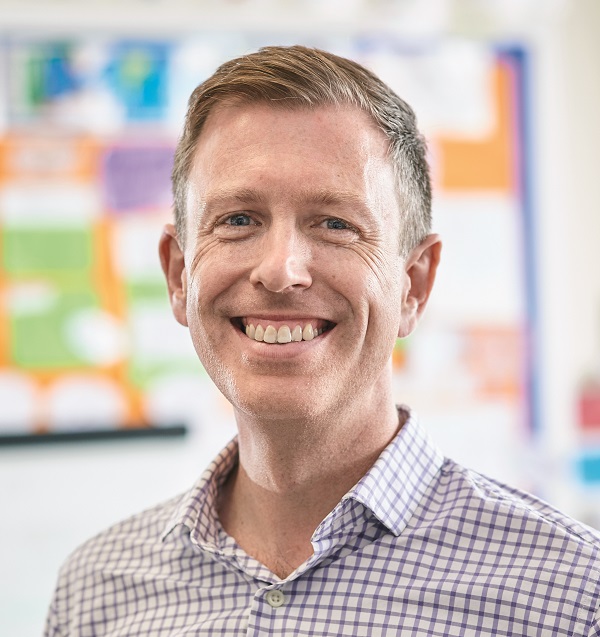 Name: Kensington Primary
Headteacher: Ben Levinson
Location: Manor Park, London
Ofsted rating: Outstanding
Size: 500+
Extra info: the school was judged to require improvement when inspected in 2014
Name: Kensington Primary
Headteacher: Ben Levinson
Location: Manor Park, London
Ofsted rating: Outstanding
Size: 500+
Extra info: the school was judged to require improvement when inspected in 2014
1. High turnover
Kensington Primary is based in Newham, a borough with the second highest child poverty rate in London and high rates of overcrowded, temporary accommodation. The school has a huge number of mid-phase admissions, as Ben explains:
‘Last year we had nearly 150 children join, in a school of 570. People are moved in here when they first come to the country and a lot of them are on temporary contracts.’
Children of immigrant parents who have no recourse to public funds are often living in dire circumstances, says Ben. ‘They sit below other pupils in terms of the levels of deprivation they face, yet they do not receive pupil premium funding.’
The school works with some of its most vulnerable families to help them develop their parenting skills via the national Parent Gym initiative. This is a series of six two-hour workshops delivered by a trained member of staff. The sessions cover things like how to communicate, balancing warmth and discipline and how to encourage learning.
‘Some of our parents had a really poor model when they were children of what being a parent is,’ explains Ben. ‘Also, because of the high turnover in this community, some people feel very isolated, so we support them in terms of strategies for working with their children. The feedback we get is that it can be transformative. Some parents, and their children as a result, have had their lives turned round.’
2. Future proofing
Ben and his staff are passionate about developing all aspects of their children and the school runs five unique initiatives, named Leads, Cares, Achieves, Futures and Exceeds.
‘Kensington Leads and Futures are all about developing leadership skills in our children,’ Ben explains.
‘We teach children all this information, but some of it will be totally irrelevant in ten, 15 years time. I don’t know what’s going to be useful to these children when they leave school and get a job – it’s too far in the future – but I’m pretty sure they will need to be confident, resilient, adaptable and able to communicate. These programmes are about developing those skills in our children so when they do move on, they’ve got what they need to get a job and be happy in life.
‘It’s not just about English and maths. Yes, it’s important to have that grounding, but when I have people applying for a job here, I’m not massively interested in what A-Levels they did. It’s more about how that person presents themselves.’
As part of the Kensington Exceeds initiative, the school has teamed up with universities and colleges to encourage the children to aim high.
‘The London Design and Engineering University Technical College is working with our Y6s – they’re coming up with ideas for using robots. It’s all about exciting and enthusing our children and getting them to see what’s possible and think about the future.’
3. Success stories
Under Ben’s leadership, the school has seen a remarkably swift upturn in results and is now in the top 1% of schools in the country for progress from end of Reception to Y2.
‘I’m very proud of that fact, but there’s always more to do,’ says Ben.
‘Our aim is to have 100% of the children leaving this school at expected. As at any school, we have some children with severe special needs, but over the next few years we truly believe that with the work we are doing we can ensure that 100% of children, apart from maybe those one or two, should be able to get to that expected standard by the end of Y6. We shouldn’t write children off at seven, eight, nine years of age. Who knows that they’re capable of?
‘We’ve had some incredible success stories of children who in any other context would have been written off, but because we haven’t done that those children have made progress and closed that gap.’
Ben is a keen proponent of the Pareto Principle – the idea that 20% of input leads to 80% of output.
‘We’ve spent a lot of time defining that 20%,’ says Ben.
‘Unless what we’re doing is impacting on children, why are we doing it? We are constantly talking to staff about that and getting feedback. I think we have a pretty open culture. When I first got here, to move things forward at the pace that we did, things had to be more directive and controlled, but one of the things I’ve been trying to change over the last year is developing an autonomous staff, with decision making devolved to the lowest level.’
Teaching staff are no longer asked to gather lots of data and are encouraged to mark books within lessons. Planning styles are also not dictated.
‘I don’t care whether it’s on a flip chart or if you’ve written a six-page daily plan – although I’d be worried about your workload if you did that. As long as what’s happening in class is impacting children and moving them on, that’s all that matters,’ says Ben.
Just before the summer holidays, class teachers were given time to meet with next year’s teachers to pass on pupil-specific tips and tricks that they’d learnt over the year. ‘It’s about giving people the time and support to do that sort of thing,’ says Ben.
Every staff meeting during the autumn term at Kensington is focused on ways of supporting children who are not reaching their expected levels. ‘Spending four weeks at the beginning of term gives teachers the time to really understand those children,’ explains Ben.
‘They meet with the child’s previous teachers and really try to understand what that pupil is interested in, what their family history is, who their friends are, what they are good at and what they’re finding hard. No child just ‘can’t be bothered’.
‘They might be disengaged because they’ve sat there for two years not understanding what’s going on or because home is horrendous or because they’ve fallen out with their friend, so it’s about really drilling down into why it is that that child is finding their learning difficult, and then thinking about ways of supporting that. For me, that’s really exciting.’
4. Incredible commitment
One of the challenges of enacting rapid change in an organisation is keeping everyone onside, a fact that Ben is only too aware of. ‘It’s all very well being ambitious, but that can be quite draining, quite exhausting,’ he says.
‘I make sure I walk the school every day and talk to staff whenever I can. I don’t squirrel myself away. There have been a couple of times over the last three years where we’ve felt close to breaking point and we’ve had to really step off and say, ‘Right, we’ll shelve this, we’ll put that on ice’. We’ve very ambitious and we want the best, but we don’t just push, push, push. I’m here at a stupid time every morning, but I tend to go home at a reasonable time, and I give the same message to my staff.
‘If they’re doing 50 hour weeks as a regular thing, they need to come and speak to someone. I think, I hope, I believe, that generally it is a manageable workload at this school. That’s incredibly important because you are not going to impact on those children if you’re knackered. The most important thing is having the energy to stand up in front of 30 children day in, day out, and that’s exhausting. People aren’t worried or stressed about coming to work here, I hope, and in a lot of cases I think they are genuinely excited about it. That’s something we need to keep on building.’
Ofsted visited Kensington again in 2016, during the last week of the school year, and awarded it with ‘outstanding’.
‘Obviously everyone was really happy,’ Ben says.
‘It’s an amazing achievement to have got there from where we were in such a short period of time. It was only possible because of the incredible commitment of all of our staff and the fact that they wanted to transform this school. But it was never about Ofsted, it really wasn’t. I’m sure lots of heads say that, and it’s impossible not to have that it in the back of your mind when you know you’re getting an inspection within two years, but what was important was building a school that delivered for our children and community.’
Never one to rest on his laurels, Ben’s first thought on the day after receiving the report was, ‘What’s next?’. He says, ‘I am obsessed with always doing better – there’s always more we can do. There’s still things we need to work on, and that’s what we’ve done this year and it’s what we’ll do next year and every year.’
EAL empathy
With an extraordinary number of children leaving and joining through the year, the Kensington team is adept at slotting children in and getting them up to speed as quickly as possible, as EAL and community lead Soofia Amin explains:
‘They come as quickly as they leave. The teachers are very used to it, as are the children. They are very good at making sure they’re welcome. It’s a whole-school effort.’
New arrivals follow a standard procedure during their first few weeks. Whether they speak English or not, they spend their first few days in the classroom with their teacher to get used to the daily routines. They are then assessed for EAL and phonics and within two weeks are put into a suitable programme.
‘A week where just one child joins is quite unusual,’ explains Soofia. ‘If we have a child who is from the UK or speaks English I normally fall off my chair – that’s unusual for our school.’
One of the positive aspects of having such a high turnover, according to headteacher Ben Levinson, is the sense of empathy it instils in the children.
‘Three months after joining the school themselves, they’re helping another child to settle in. They know what it feels like. They are a really caring group of children.’
Soofia agrees: ‘Even if they come from abroad and don’t have English, they very quickly get confident, because there’s nobody judging. I’ve never seen a child be made fun of at this school – the whole atmosphere is very supportive.’
Pupil Voice
Hana
 We asked children to bring in clothes that didn’t fit them so we could donate them to others. We’ve also got boxes for old ink cartridges and phones. We give the money to a hospice for terminally ill children.
We asked children to bring in clothes that didn’t fit them so we could donate them to others. We’ve also got boxes for old ink cartridges and phones. We give the money to a hospice for terminally ill children.
Aysha
 Every term we have a celebration and invite elderly people within our borough. Sometimes we serve them lunch and we have conversations with them. Recently we started a knitting club – the elderly people came and we all knitted.
Every term we have a celebration and invite elderly people within our borough. Sometimes we serve them lunch and we have conversations with them. Recently we started a knitting club – the elderly people came and we all knitted.
Shafi
 In Kensington Cares we separated food into different boxes and dropped it off near the library. Some of the children carried it but most of it was carried in cars. The food goes to migrants and refugees.
Ziyad
In Kensington Cares we separated food into different boxes and dropped it off near the library. Some of the children carried it but most of it was carried in cars. The food goes to migrants and refugees.
Ziyad
 Every Monday afternoon we have a one-hour Mandarin lesson. Sometimes we do role play and have conversations with each other. Last term we had a Mandarin test and we had the highest percentage of passes in the local area.
Every Monday afternoon we have a one-hour Mandarin lesson. Sometimes we do role play and have conversations with each other. Last term we had a Mandarin test and we had the highest percentage of passes in the local area.
Meet the staff
Meredith Clements, Y5 teacher
 We play a game called ‘Keep, ditch, tweak’. We take different projects and have a critical look at them. Do we want to keep them how they are or change them? We’ll share ideas and that way we’re always reflecting, improving and driving things forwards. If we ever felt that what we were doing wasn’t having an impact on the children, Ben would be more than happy to talk about different ways of doing things.
We play a game called ‘Keep, ditch, tweak’. We take different projects and have a critical look at them. Do we want to keep them how they are or change them? We’ll share ideas and that way we’re always reflecting, improving and driving things forwards. If we ever felt that what we were doing wasn’t having an impact on the children, Ben would be more than happy to talk about different ways of doing things.
Jon Pell, Y6 teacher
 My route into the classroom was the Troops to Teachers initiative because I’m ex-army. I grew up around here and when I left the army I wanted to get into teaching. Joining this school has been fantastic – it’s a really good school to train in. I like the autonomy given to teachers here. There’s no prescribed method of teaching. Everybody learns off one another and feels comfortable bringing what they’ve learnt into the classroom.
My route into the classroom was the Troops to Teachers initiative because I’m ex-army. I grew up around here and when I left the army I wanted to get into teaching. Joining this school has been fantastic – it’s a really good school to train in. I like the autonomy given to teachers here. There’s no prescribed method of teaching. Everybody learns off one another and feels comfortable bringing what they’ve learnt into the classroom.
Tajana Ujevic, EYFS phase leader
 We’re not just teachers. We’re nurturers and in loco parentis – especially for the younger children. Some of our children come into Reception with no knowledge of anything – some haven’t been taken out of their buggies yet. In six or 12 months time they are chatting away to you and are excited about coming to school. That drives you on. Even though sometimes you’re exhausted, you have a sense of purpose and achievement.
We’re not just teachers. We’re nurturers and in loco parentis – especially for the younger children. Some of our children come into Reception with no knowledge of anything – some haven’t been taken out of their buggies yet. In six or 12 months time they are chatting away to you and are excited about coming to school. That drives you on. Even though sometimes you’re exhausted, you have a sense of purpose and achievement.
Soofia Amin, EAL & Community Lead
 After her Parent Gym course, one mum said to me that her house has changed – her relationship with her husband is good because they’re not blaming each other any more and her son is now responsive. Before, she didn’t have any systems in place. We teach parents the basics: structure, routines, reward charts and looking at how they communicate. It’s not rocket science – just very simple strategies – but every session is amazing.
After her Parent Gym course, one mum said to me that her house has changed – her relationship with her husband is good because they’re not blaming each other any more and her son is now responsive. Before, she didn’t have any systems in place. We teach parents the basics: structure, routines, reward charts and looking at how they communicate. It’s not rocket science – just very simple strategies – but every session is amazing.







